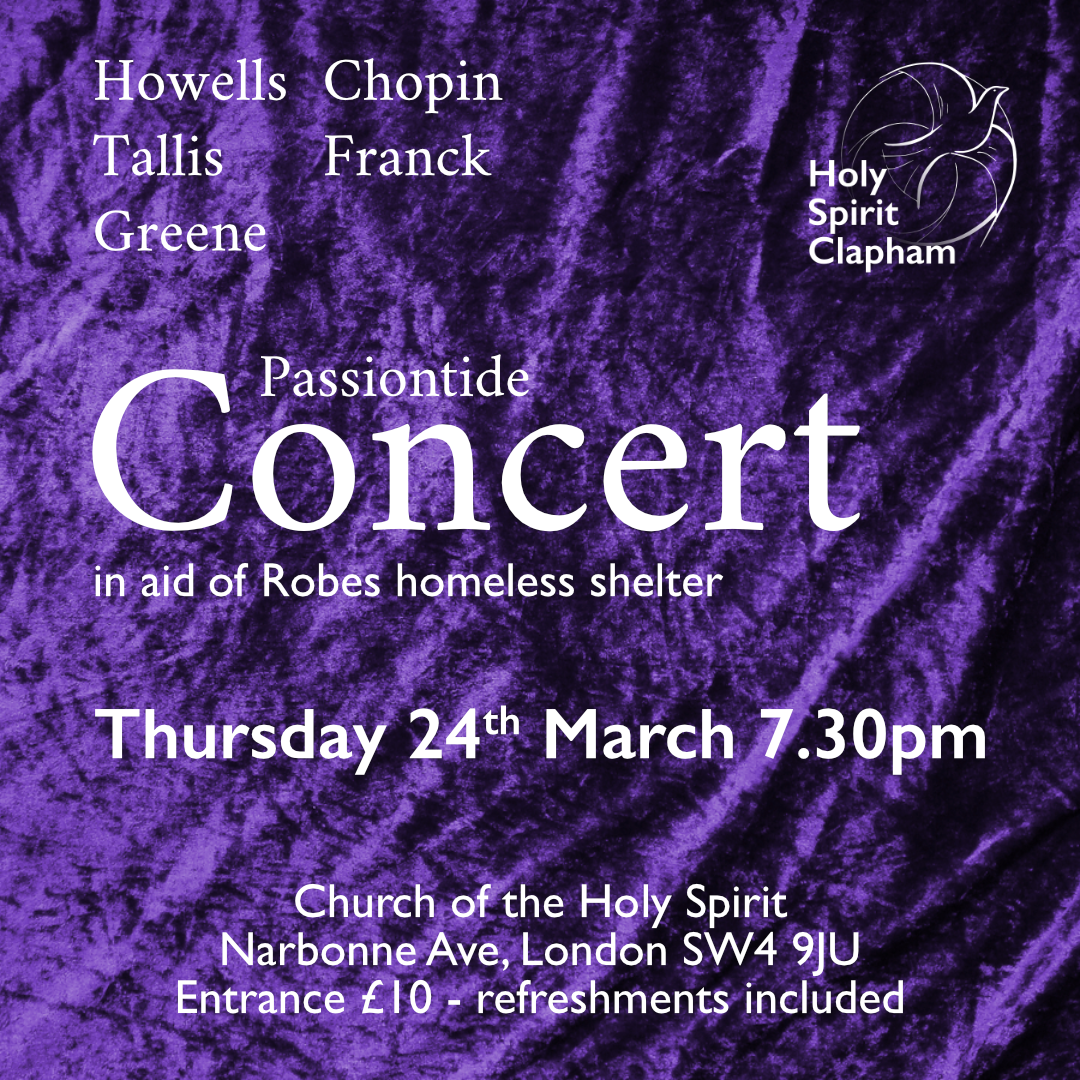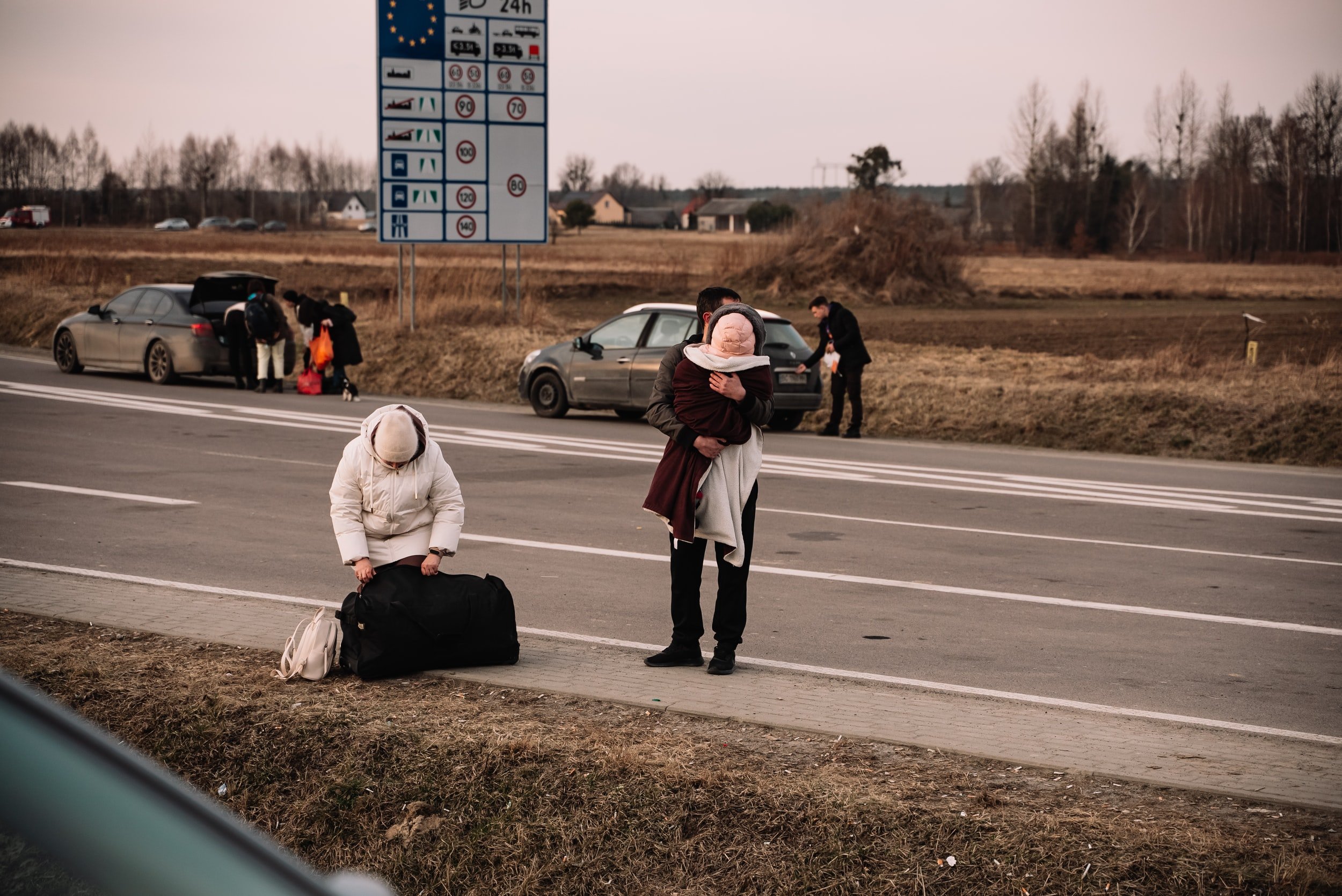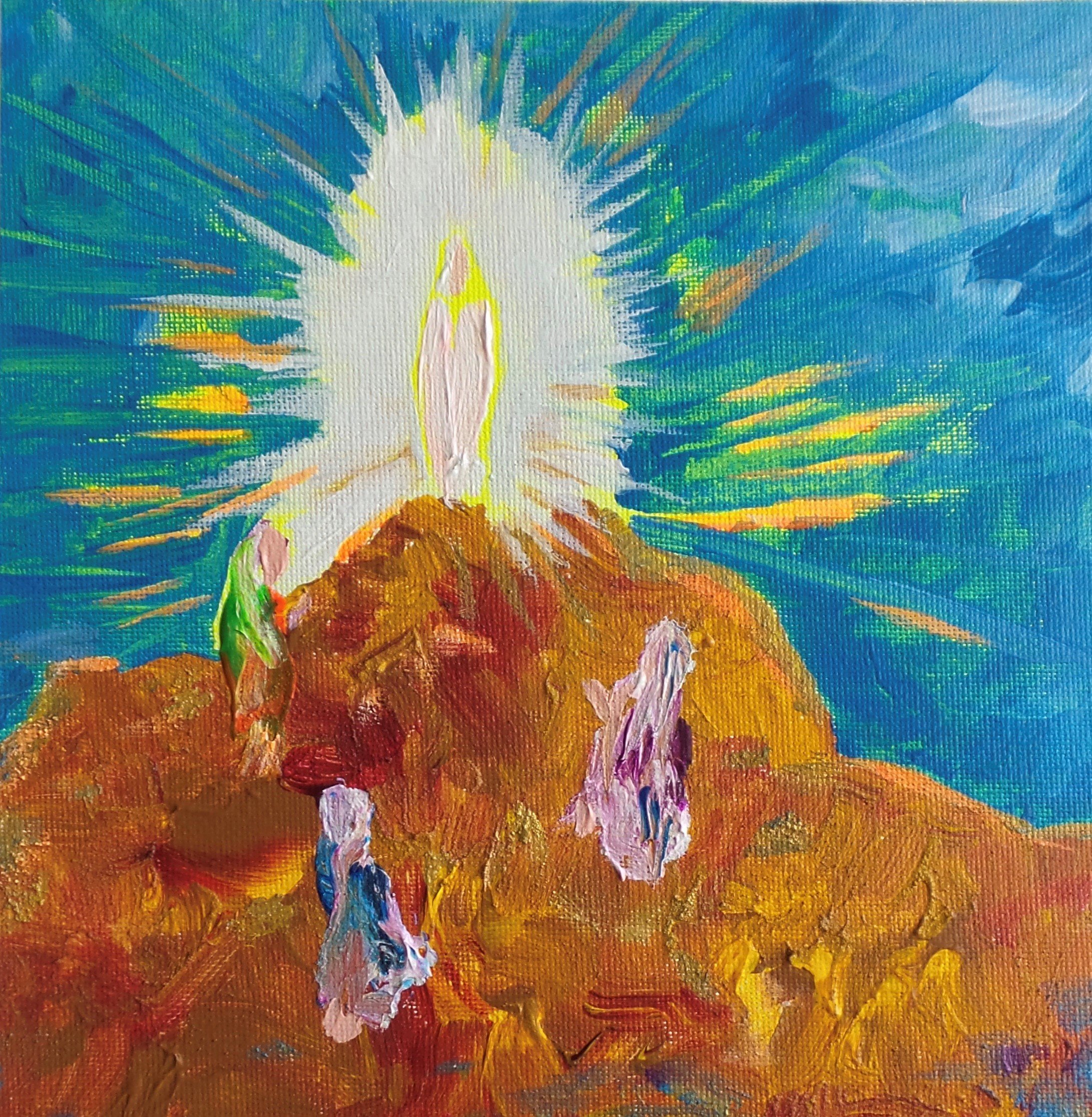
Third Sunday of Lent
If only life were fair. If only good things happened to good people and bad things to bad people. In Luke 13:1-9 Jesus firmly rejects the concept of fairness. People do not get what they deserve. Jesus follows with the story of the barren fig tree which has borne no fruit for 3 years. The owner wishes to cut it down but the gardener pleads to be able to nurture it for a further year. In God’s economy generosity always outweighs fairness. Yet we often fail to enjoy this generosity because we are so wedded to a transactional approach to life. As Isaiah 55:1-9 exclaims, we would rather strive and work for the good things in life than receive them as a gift, because we want to believe that all that we have is down to our merit. It isn’t. If we could appreciate how much of what we enjoy is a gift perhaps we would be minded to share more of it with others.
Big Brekkie for Christian Aid
This year’s Big Brekkie for Christian Aid will be held at Holy Spirit Clapham on Sunday 15th May 2022 at 8:30 a.m.
Get a delicious breakfast and support Christian Aid!

Second Sunday of Lent
Lent calls us into the wilderness to discover who we are and what we were made for.
This week our readings move from the margins to the centre: we begin, in Genesis 15:1-18, with Abraham’s nomadic journeying far from home to a place where God tells him he and his offspring will be aliens and strangers. By the time we reach our gospel reading, Luke 13:31-35, Jesus is speaking to the offspring of Abraham in the centre of their world, in the temple, in the city of Jerusalem. He reminds them that they have forgotten who they are and what they were made for: not to bargain for power with those who are in the centre of things, but to travel out to the margins and take God’s blessing to all people.

Refugees from Ukraine – what can we do?
At the time of writing, more than 2.5 million people had fled the conflict in Ukraine to neighbouring countries (UNHCR) in what could become Europe's worst refugee crisis of the 21st century, and the worst since the Second World War.
The British government has now reconsidered its Ukrainian immigration policy in light of growing people bloc pressure. In addition to making the process less onerous for family members with passports, a new sponsored humanitarian refugee route is set to be announced.

Passiontide Concert
On Thursday 24th March at 7.30pm there will be a Passiontide Concert at the Church of the Holy Spirit (Narbonne Avenue, London SW4 9JU).
The programme includes choral singing, instrumental pieces and readings.
The concert is being held to raise funds for homeless shelter, Robes.
Entrance costs £10 which includes cheese and wine to enjoy during the performance.

First Sunday of Lent
Lent poses a question for us: who do we think we are? What lies at the core of our identity? In both our readings for the First Sunday of Lent we are taken into the wilderness. In Deuteronomy 26:1-11, the people of God, now settled in the Promised Land, are asked to remember their time in the wilderness and to use that memory to determine who they are and how they should live. They are to give, to offer hospitality, to welcome the stranger and the foreigner because they too had experienced being foreigners and strangers. The time in the wilderness has taught them that they are not to be defined by what they have or where they live but to whom they belong; God. Jesus’ time in the wilderness, Luke 4:1-13, mirrors this experience. It is here that Christ must claim his identity, what kind of leader, what kind of servant will he be? Again and again he returns to scripture and finds the answer: I am who I am because God is who God is. There are many people, many ideologies, many institutions that want to tell you who you are and how you should behave. Lent is a time to stop listening to them and listen again to the voice that tells you “you are my beloved child, on whom my favour rests.”

Pancake Party
On 1 March, we held a Pancake Party for Children of Primary School age.
The assembled company, made pancakes and took part in a pancake race and other games.


Be our Christian Aid rep!
We are looking for someone to take on the role of Christian Aid representative.
This isn’t a big role. It involves organising an annual collection to coincide with Christian Aid week and the occasional fundraiser.

Theology Uncorked!
The next Theology Uncorked! will take place on Friday 8th April in the main body of the church at 7.30pm for an 8pm start.
Robin has left the topic open to suggestions, so please let Rachel Edge know if you have any ideas of what we could discuss!


#LiveLent: Embracing Justice
This year, we shall be following the Church of England’s Lent course #LiveLent: Embracing Justice, based on the Archbishop of Canterbury’s Lent Book 2022, Embracing Justice by Isabelle Hamley.
There’s a daily family activities calendar to follow.

Sunday next before Lent (The Transfiguration)
It is easy to be blinded by light. This week’s gospel falls into two distinct halves: the first half, at the top of the mountain, is the shiny half: dazzling clothes, shining faces, voices booming from clouds, the sudden appearance of long-dead heroes of the faith. The second half is less dazzling. Jesus and his disciples trudge down the mountain to confront chaos, failure and brokenness. The disciples wanted to stay at the top basking in the light, but the difference between this reading, Luke 9: 28-43, and the first reading, Exodus 34:29-35, is that God comes to us, not us to God. God shows up in the mess and the struggle and it is here, not on the mountain top, that the true glory of God is revealed.


Second Sunday before Lent
Last week Jesus invited us to stand on “level place” with him: encouraging us to step down when we find ourselves above others and to step up when we find ourselves beneath others. This week it looks as though we are being urged only to step down, to take the lower place. In our Old Testament reading, Genesis 45:3-11, 15, Joseph is not seeking revenge, but only reconciliation with his brothers. He does not hold them responsible for their actions against him. In our gospel, Luke 6:27-38, Jesus urges us to turn the other cheek, walk the extra mile, give the shirt from our backs. Such texts need to be handled carefully. They can be, and have been, used to exhort the downtrodden to stay down. In their own context though they offer something subversive: a Roman soldier could make a Hebrew carry his pack for one mile but not two, could take his cloak but not his shirt. By giving more, Jesus' hearers were engaging in civil disobedience, revealing the injustice at the heart of the law. To be generous in the face of greed, to love in the face of hate, is to refuse to be defined by that injustice, but instead to commit to a different way of life.

Third Sunday before Lent
Both of our readings (Jeremiah 17:5-10, Luke 6:17-26) today imagine a great reversal: the hungry are now full, the rich are now poor, the bottom is now the top, and the top is now the bottom. I can see that such a vision can be helpful: it may give comfort to those who have little with the promise of future plenty, and it may prick the consciences of those who have more to make that future happen. One thing it does is to undermine the common view (then and now) that we are responsible for our own fate, that we deserve what we get; if we are poor or in trouble we only have ourselves to blame, whereas if we enjoy security and plenty we must have earned it. I am still left uncomfortable with the idea that anyone should be on top or anyone on the bottom, and this may be where the Beatitudes are leading us: should there be a top and a bottom? Would it be possible to imagine a world in which there are no rich or poor, no powerful or powerless? What would such a world look like? What do we need to do to stand with Jesus “on a level place”?

Theology Uncorked!
The long-awaited return of Theology Uncorked will take place on Friday 25th February 7.30pm for an 8pm start.
Andrew Bailey will be leading us in a discussion on predestination, free will and associated themes.

Choral scholarship - tenor
Choral scholarship - tenor
If you sing tenor or know someone who sings tenor who would be interested in our choral scholarship scheme, then please share this link with them.- https://www.holyspirit-clapham.org.uk/main-feed/choral-scholarships

Fourth Sunday before Lent
These days everything seems to be running out: public finance, oil and gas, healthcare and social support, even wellbeing and goodwill seem to be in short supply. We look upon the world around us as a place of scarcity: whether it’s jobs, doctors’ appointments, truck drivers or natural gas – there just doesn’t seem to be enough of it. In today’s gospel, Luke 5:1-11, the fishermen at the shore have empty nets, they have worked all night and have nothing to show for it. And then miraculously, along comes Jesus and, boom, their nets are filled with a superabundance of fish. Such abundance that they can barely bear the weight of it. This seems too good to be true; the kind of miracle stories that have no relevance to us once we leave Sunday School. Looking at this familiar story afresh this week I am struck, not so much by the abundance, as by the efforts made by the community. The decision to put out to sea again, to commit yet more scarce resources to an uncertain venture, is made together. Not just by the crew of one boat but by many; the catch, when it comes, is landed by many boats. What Jesus gives to this community is the imaginative vision to take the risk but they have to do it together, all hands on deck, literally. How can this story bring us to look at the world around us as a place of abundance not of scarcity? Perhaps, the truly abundant resource here is the community. The planet may well be running dry of oil and gas and the public coffers running dry of credit, but we are not running out of people. What we need is the imagination and the vision to take the risk of pooling our resources and striving together for something better than our individual security.

Candlemas (Presentation of Christ in the Temple)
Today we celebrate the feast of Candlemas which marks the end of Epiphany. This is the day we take the Nativity scene out of the church and process with candles: symbolising that God is no longer separate from us; we too can bear Christ’s light in the world. The first reading, Malachi 3:1-5, describes how when God comes to earth it will be with awe and terror. God’s presence is seen as a fire that will purify the people, burning away their impurities. In the gospel, Luke 2:22-40, however, God is no longer terrifyingly “other”. Mary and Joseph come to the temple with Jesus just like would the parents of every other new child; yet Jesus is recognised as unlike every other child. Here we have a meeting of opposites: old and young, male and female, divinity and humanity. In Christ heaven and earth meet and all things are reconciled.
